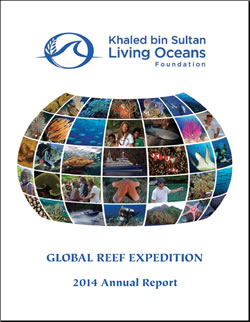2014 Annual Report
(2014)
Please find an excerpt of the full PDF below
 2014 marked the fourth year of our historic Global Reef Expedition. On our journey around the world’s coral belt we have been rewarded with scientific discoveries and concerned by the pace and scale of the coral reef crisis. During the first half of 2014 we spent time on land processing some of our coral reef data while our research ship, the M/Y Golden Shadow, underwent a 20 year inspection and overhaul.
2014 marked the fourth year of our historic Global Reef Expedition. On our journey around the world’s coral belt we have been rewarded with scientific discoveries and concerned by the pace and scale of the coral reef crisis. During the first half of 2014 we spent time on land processing some of our coral reef data while our research ship, the M/Y Golden Shadow, underwent a 20 year inspection and overhaul.
In September we were back at sea on one of the world’s most iconic reefs, the Great Barrier Reef (GBR) in Australia. The GBR is the world’s most extensive and richest coral reef ecosystem, earning UNESCO World Heritage Site status in 1981. It is one of the most actively managed coral reef ecosystems on the planet, hopefully serving as a model for the future. We were there to survey reefs on the more remote northern section of the GBR.
We have a standard methodology that we have been using to collect data from reefs in different countries. Ultimately this will allow us to compare reefs from different sides of the planet and draw conclusions about the global state of our reefs. On the Great Barrier Reef, aside from our standard global reef expedition surveys, we surveyed the fish and corals in conservation zones established by the Great Barrier Reef Marine Parks Authority.
The GBR is a multiple-use region. Zones colored pink are ‘no-go’ areas, green zones are ‘no-take’, and yellow zones are ‘limited-take’ areas. We dived and collected data in each of these zones, and while we witnessed that the zoning appears to be having a positive effect we are anxious to complete the data analyses to confirm this.
Our year ended with a successful survey and mapping of the coral reefs of the Solomon Islands. The Solomon Islands are at the eastern edge of the Coral Triangle, the global epicenter of marine biodiversity.
While the reefs there are still remarkably alive and diverse, rapid population growth is placing more and more pressure on the fragile reef resources. We hope that our surveys, maps, and recommendations will inform the Solomon Islands in future conservation efforts. Thanks for your interest in our work to conserve the world’s oceans!
